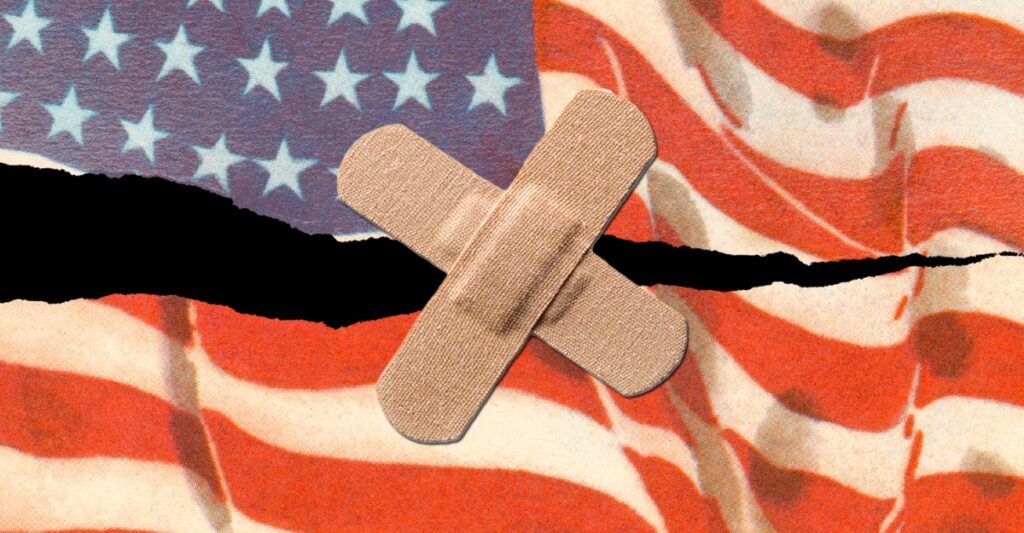Robert F. Kennedy Jr. is wrong about a lot of things in public health. Vaccines don’t cause autism. Raw milk is more dangerous than pasteurized milk. And cellphones haven’t been shown to cause brain cancer. But the basic idea behind his effort to “Make America Healthy Again” is correct: America is not healthy, and our current system has not fixed the problem.
Joe Biden entered office promising to “beat” the coronavirus pandemic, cure cancer, and get more people health care. Arguably no one on Earth can talk more passionately about funding cancer research than Biden, whose son Beau died of brain cancer in 2015 and who, in 2022, announced an initiative to halve U.S. cancer deaths in the next 25 years. Robert Califf, Biden’s FDA commissioner, has been particularly stalwart in arguing that the agency must play a role in reversing a “catastrophic decline” in Americans’ life expectancy, and has repeatedly warned of “an ever-growing epidemic of diet-related chronic diseases,” such as cardiovascular disease and type 2 diabetes. A 2019 study found that just 12 percent of Americans are considered metabolically healthy, based on their waist circumference, blood sugar, blood pressure, and cholesterol.
Of course Biden’s White House was never going to end cancer or obesity in four years. But many of its policies barely scratched the surface of America’s wide-ranging health problems. Despite Califf’s dramatic language about the country’s diet problems, for example, the FDA’s efforts to improve the situation have mostly revolved around giving Americans more information about healthy foods.
The public-health bureaucracy that the Trump administration will inherit is more focused on and skilled at treating America’s health problems than preventing them. That shortcoming—despite the billions of dollars spent every year at these agencies—has damaged the credibility of the public-health establishment enough that Kennedy is now Donald Trump’s nominee for secretary of Health and Human Services. Marty Makary, Trump’s pick to lead the FDA, has similarly risen in prominence by second-guessing “medical dogma” in the U.S. and beyond. And Trump’s pick to lead the CDC, former Representative Dave Weldon, has criticized the agency’s vaccine policies and once attempted to block its vaccine-safety research because of what he claimed were conflicts of interest. A set of men who have made careers of distrusting our existing health-care agencies may soon be empowered to try to blow them up.
The Biden administration, to be fair, had less time to deal with America’s deeper health issues, because it was forced to deal with at least a few calamities. Much of Biden’s term was spent navigating the country out of the pandemic. On the whole, his administration achieved most of its COVID goals. The Biden White House provided Americans with free COVID tests and mounted a vaccination campaign that resulted in more than three-quarters of the country getting a shot. Still, the pandemic left the CDC beleaguered by claims that it was simultaneously too slow and too aggressive in its efforts to fight the virus. During Biden’s presidency, the agency promised to “share science and data faster” and “translate science into practical policy,” but it has struggled to respond to the continued spread of bird flu. Public-health experts have slammed the CDC for not sharing enough information about the virus’s spread, including a human case in Missouri earlier this year, and farmers have been reluctant to implement the agency’s recommendations for preventing transmission of the virus from sick cattle to humans.
Some of those calamities were self-inflicted. The FDA is entrusted with ensuring that our food and medicines are safe, and it generally does spot issues quickly after they occur. But for months, the FDA failed to act on a whistleblower complaint alerting regulators to deplorable conditions at an infant-formula factory that eventually caused nationwide formula shortages and two infant deaths. The FDA is also supposed to decide what tobacco products can be sold, but it has failed to police the illegal market for vapes and nicotine pouches, such as Zyn. And for all the administration’s talk of being guided by “science and truth,” the White House seemingly bowed to political pressure and abandoned a plan to ban menthol cigarettes at the very end of a long rule-making process. The past four years have revealed that crucial parts of the agency’s remit—most notably its oversight of tobacco and the food system—have been neglected by agency leadership; in 2022, independent reviews of the FDA’s food and tobacco centers found that both lacked clarity on mission and goals.
At the same time, the administration has failed to deliver on its loftier ambitions. Biden quietly dropped some of his bolder ideas, such as his campaign promise to create a public-option insurance plan. The Advanced Research Projects Agency for Health, a new government agency that funds high-risk, high-reward research and is essential to Biden’s cancer goals, is in its infancy, and Republicans in Congress are already eager to cut its budget. And some promises, such as Biden’s grand goal to help change America’s diet, have been approached more like trivial pursuits.
The administration branded its 2022 hunger and nutrition conference, for instance, as the largest and most important gathering on nutrition policy since the Nixon administration. That 1960s conference led to millions of children gaining access to school lunch and to the creation of the Special Supplemental Nutrition Program for Women, Infants, and Children (or WIC), which provides food to about 6 million Americans each month. The Biden administration’s summit ended with a pledge to end hunger and improve America’s diet by 2030, but the steps taken toward tackling those goals—such as developing a plan to add warning labels to unhealthy foods—have been modest. And all the agency has done so far on that project is conduct research on the labels’ potential design. The FDA has also pledged to lower the sodium in foods, but the targets it’s set for the food industry are entirely voluntary.
These efforts are understandably careful and bureaucratic. The agency’s caution over warning-label design comes amid threats from the food industry to sue over any label deemed unjustified. Indeed, in the U.S. legal system, regulators have trouble mandating that companies do much of anything without it being branded as unconstitutional. But the Biden administration’s efforts look comically inadequate given the scope of America’s health problems.
RFK Jr. is promising a break from the status quo. This is not to say that he, should he be confirmed as health secretary, has a better plan. Most of his ideas amount to little more than pronouncements that he will take sweeping actions immediately once Trump is sworn in as president. The reality is that many of those efforts would take months, if not years, to implement—and some might not be feasible at all. He has signaled, for example, that he will clear house at the FDA’s food center, despite rules that prevent government bureaucrats from being fired willy-nilly. He also has pledged to ban certain chemicals from food, which he’s argued are contributing to American’s lower life expectancy. But for every chemical the FDA bans, it will have to go through a lengthy regulatory process, which would likely be challenged by food companies in court. Kennedy’s notion of significantly altering the system of fees that drug makers pay the FDA to review their products would likely send the agency into a budgetary crisis.
If Kennedy gets confirmed to lead HHS, he will quickly be confronted with the reality that governing is a slow and tedious process that doesn’t take kindly to big, bold ideas, even with an impatient leader like Trump calling the shots. At the outset of his first term, Trump declared war on drug companies, which he claimed were “getting away with murder” due to their high prices. Trump’s then–health secretary, Alex Azar, in turn spent the next four years trying radical fixes that included requiring drug makers to post their prices in TV ads, importing drugs from Canada, tying American drug prices to other countries’, and eliminating the rebates that middlemen negotiate for insurance companies. But each idea got bogged down in bureaucracy and lawsuits. Trump’s early attempts to contain COVID by blocking international air travel similarly did little to keep the virus out of America, despite his claims at the time that the policy “saved us” from widespread outbreaks.
Biden benefited from Operation Warp Speed’s rapid push to create vaccines, but it was his team of technocrats that finally got them distributed. And they eventually lowered drug prices too, in a much simpler way than Trump was proposing. But technocracy has also failed to address our most pressing—and most visible—health problems. Trump’s picks have little experience navigating the Rube Goldberg puzzle that is American bureaucracy. They certainly aren’t afraid of trying something new, but we’re about to find out how far that will get them.


